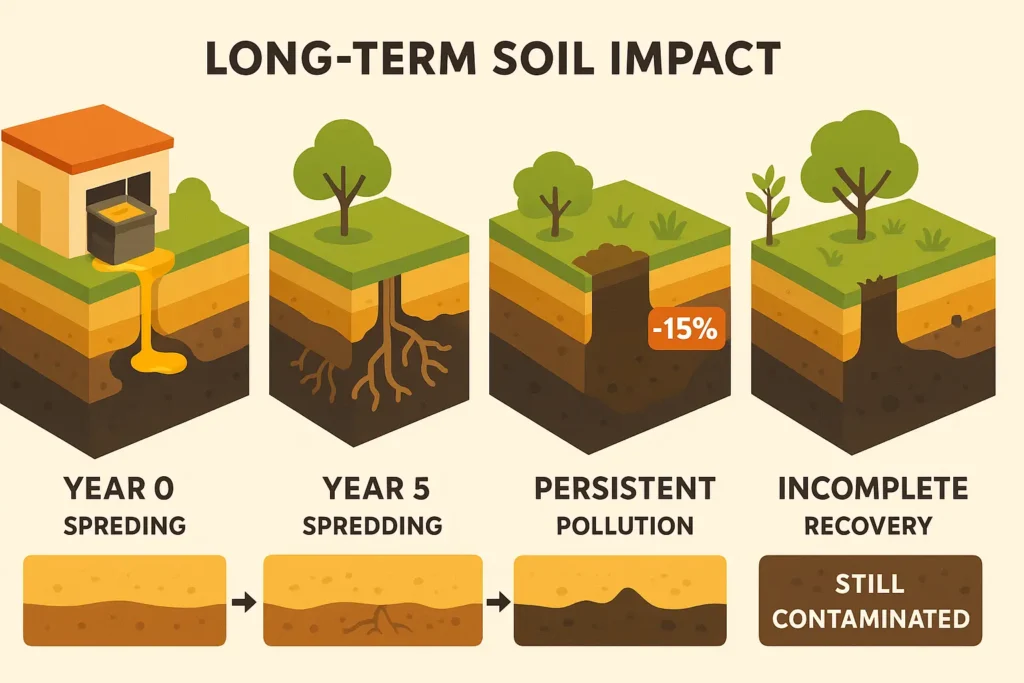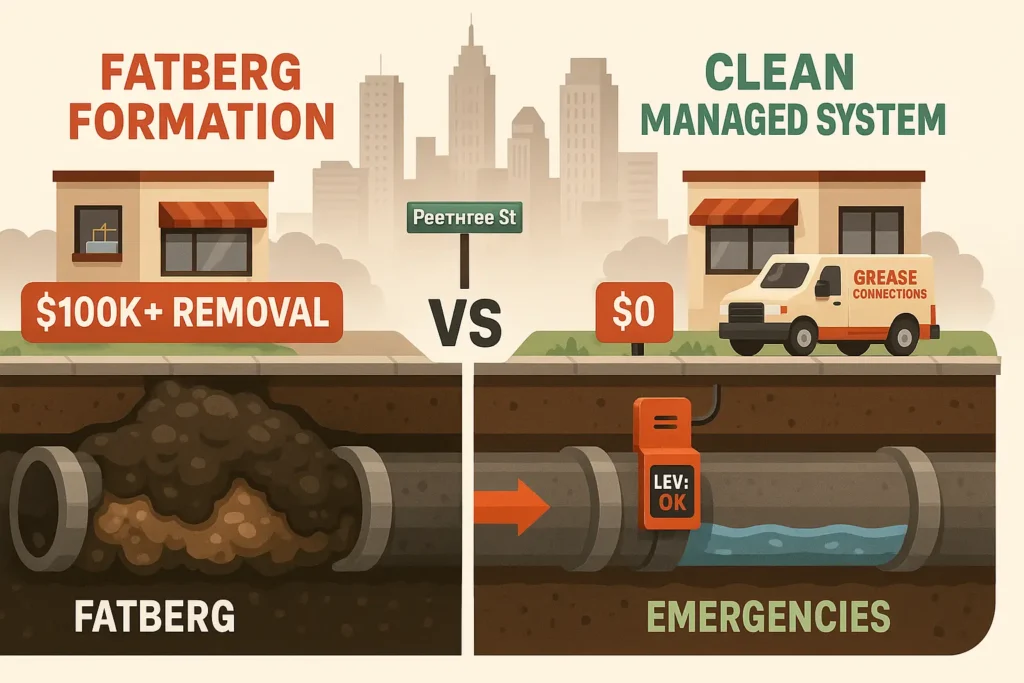Table of Contents
The Oil Doesn’t Disappear It Multiplies Its Damage
Even “natural” vegetable oil breaks down slowly in sun starved pipes and riverbeds. Thick layers rob water of oxygen and coat soil particles, creating a legacy pollutant that outlasts the restaurant that poured it away.

Waterways That Suffocate for a Generation
Miami’s coral outcrops, Savannah’s salt marshes, and Newark’s tidal flats all suffer when oil films block sunlight and micro organisms strip oxygen. Field studies show chronic low oxygen “dead zones” persisting 15 years after repeated grease spills. Fish exposed to even thin slicks develop reproductive defects that echo through entire stocks.
Soil and Groundwater That Refuse to Heal
Pouring fryer oil behind a strip mall dumpster locks triglycerides into clay and sand, cutting off the air pockets roots need. Lab tests confirm cooking oil can linger in soil for more than a decade, leaching rancid compounds that taint aquifers feeding Tampa and Athens wells. Property records near historic dump sites in central New Jersey sell 8 15 percent below market until remediation is certified.
Fatbergs: When Pollution Turns to Concrete
Inside Orlando’s 1970s clay pipes and Newark’s century old brick sewers grease mixes with calcium and wipes, hardening into fatbergs bigger than delivery vans. One New York City cleanup cost $4.65 million; London spends up to $63 million a year. Johns Hopkins engineers warn that aging lines are “critically vulnerable,” making preventive collection cheaper than emergency pumps.
| City (Year) | Single Fatberg Removal Cost* | Overflow Fines Avoided |
|---|---|---|
| New York (2014) | $4.65 M | $2.3 M |
| Detroit (2018) | $0.10 M | $0.07 M |
| London (annual) | $19 63 M | £12 40 M |
Bioaccumulation: From Fryer to Fork Again
Oil derived polycyclic compounds hitchhike on sediment and enter shrimp, oysters, and even backyard tomatoes irrigated with tainted water. Long term studies detect contaminants climbing food chains and concentrating in top predators common on Florida menus.
Dollars, Fines, and Reputation: The Hidden Ledger
Florida DEP logged more than 900 grease driven sewer overflows in 2024 alone. Each spill can trigger five figure penalties plus lost business days. Insurance carriers in Atlanta now surcharge eateries with repeat FOG violations. Grease Connections’ clients avoid those hits because real time tank sensors alert our 24/7 dispatch before levels spike.
How Long Until Nature Recovers?
Recovery depends on flow, temperature, and sediment load:
- Open coast (e.g., Jacksonville Beach): light slicks disperse in 1 2 years, but sub tidal sludge can last 8 years.
- Estuaries (Savannah River): low oxygen pockets persist 10 15 years without dredging.
- Urban soils (Newark’s Ironbound): biological activity degrades surface oil in 3 5 years, yet deeper clay retains it beyond 20 years.
The Grease Connections Worry Free Guarantee
We collect used oil on a predictive schedule backed by 24/7 level monitoring. If we ever miss a pick up and you’re fined for a spill, we pay the ticket no paperwork, no questions. Clients from Miami’s Brickell district to Atlanta’s Midtown have documented zero emergency overflows since joining our program (internal records on file, 2023 2025).

Why It Matters to Your Kitchen
- Proactive Collection: We service Florida, Georgia, and New Jersey hubs weekly or faster when sensors ping.
- Hurricane Proof Containers: Rated to Cat 3 winds, perfect for coastal Fort Pierce and St. Simons.
- Transparent Rebates: Monthly statements show gallons collected and rebates earned audit ready.
Quick Answers for Busy Restaurateurs
- How long does it take an ecosystem to recover from a grease spill? A shellfish bed may need 10 years; a city stream often remains impaired until contaminated sediment is removed.
- Will old grease in soil reach my drinking water? Yes studies link FOG rich soils to groundwater contamination, especially in sandy coastal plains.
- Can Grease Connections service my location? If you operate anywhere in Florida, Georgia, or New Jersey from Tampa to Toms River we’re on the road nightly.








